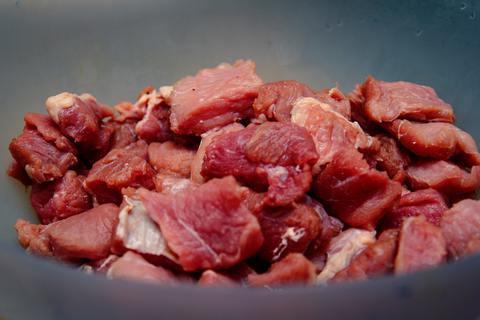What is the Healthiest Choice for Your Dog?

Your dog’s health depends on their diet. Everything that passes between your dog’s pearly whites becomes the building blocks of your dog’s cells, energy, and more. Ultimately, you want to feed your dog the best meats for a well-balanced and nutritious diet. But deciding on a protein isn’t always that easy when you factor in availability, price, intolerances, and sustainability. If you’ve been wondering, “What is the best meat for dogs?” we have the answers you and your dog are looking for.
How Does Meat Affect Your Dog?
Meat is made up of protein. And protein is one of the most important elements in your dog’s diet. Dogs need meat to thrive. What role does protein play in your dog’s body? Essentially, protein is broken down into amino acids, which is the material used to make and repair cells. Dogs need 22 different amino acids to thrive. They can make 12 of these on their own, but the other 10 need to come from outside sources: meat.
Proteins also convert to energy–the fuel your dog needs to run, play, and provide you with those kisses you love so much.
Because meat contains complete amino acids and becomes energy and builds cells, the protein you feed your dog affects every part of their body from their brain to the paws.
How the Body Uses Protein:
Proteins
-
- Build and repair muscle and other tissues.
- Supply your dog with usable energy.
- Make up the basis of your dog’s hair, nails, and skin.
- Support and improve organ function
- Are the building block of connective tissues.
- Play a vital role in the immune system.
- Strengthen the skeletal system.
- Regulate and balance enzymes for a healthy hormonal system.
How Do Meat Proteins Differ from Plant-Based Proteins?
Meat protein is considered complete proteins while vegetable proteins are often referred to as “incomplete proteins.”
If you go to the supermarket or browse artisan dog foods online, you will notice that most companies emphasise the level of protein in their foods. Yet, if you take a closer look at their ingredients or nutritional analyses, you will notice that most try to boost protein levels with plant-based proteins, like legumes, peas, and vegetables like potatoes. And while there are other benefits to these ingredients, your dog’s body processes the protein differently, and they offer incomplete amino acids.
The ten essential amino acids dogs need are:
-
- Lysine
- Leucine
- Valine
- Arginine
- Histidine
- Isoleucine
- Phenylalanine
- Methionine
- Threonine
- Tryptophan
When a dog does not get one of these amino acids through their diet, the process of creating cells, utilizing energy, and repairing the body stops.
Proteins from non-meat sources do contain amino acids, but there are not any non-meat proteins that contain all ten essential amino acids. Plant-based proteins do not have arginine, methionine, lysine, or tryptophan.
What Are Novel Meats or Novel Proteins?
When searching for the best meat for your dog, you likely found various sources reference “novel proteins.” These are less-common meats that can be beneficial for dogs that experience or develop food intolerances.
Dogs develop protein intolerance by eating the same meat for a long period of time. Over the source of their lives, some dogs’ immune systems will turn against the proteins. If your dog gradually begins to experience diarrhoea more and more often, skin rashes, and itchy skin, they may need to switch to a novel protein. Your vet can chat with you about your dog’s diet and run tests to find out if they need to switch to a novel protein diet.





